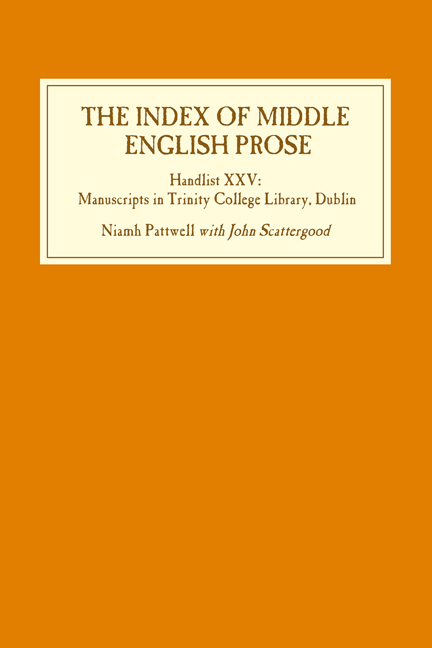Book contents
- Frontmatter
- General Introduction
- Acknowledgements
- Abbreviations
- Introduction
- Summary List of Contents
- Concordance of Old and New MS Shelfmarks
- Trinity College Library, Dublin
- Macaronic Index
- Index of Incipits
- Index of Acephalous Incipits
- Index of Reverse Explicits
- Index of Atelous Reverse Explicits
- Index of Rubrics, Titles and Colophons
- General Index
- Index of Manuscripts Cited
- Previous volumes
Introduction
Published online by Cambridge University Press: 08 May 2024
- Frontmatter
- General Introduction
- Acknowledgements
- Abbreviations
- Introduction
- Summary List of Contents
- Concordance of Old and New MS Shelfmarks
- Trinity College Library, Dublin
- Macaronic Index
- Index of Incipits
- Index of Acephalous Incipits
- Index of Reverse Explicits
- Index of Atelous Reverse Explicits
- Index of Rubrics, Titles and Colophons
- General Index
- Index of Manuscripts Cited
- Previous volumes
Summary
Trinity College Library in Dublin is probably best known as the home of the world-renowned Book of Kells, which is housed in the almost-as-famous Long Room in the old library building. The establishment of Trinity College Library in 1801 as a legal depository for books published in Ireland and the UK, in addition to its vast collection of incunabula and manuscripts, means that it is one of the largest libraries in Ireland and gives it a standing equal to the best libraries in Europe.
There are several detailed accounts of the history of the Library, which address its funding, acquisitions and administration: Peter Fox's authoritative account traces the Library's development from the foundation up to the present; a collection of essays edited by W. E. Vaughan, published in 2013 to celebrate the tercentenary of the laying of the foundation stone of the Old Library, looks at the building and its contents; Elizabethanne Boran's unpublished thesis offers insight into the early years of the Library. Of particular interest to this volume are a number of essays and studies that address the manuscript collection, specifically the manuscripts collected by James Ussher, whose library forms the main part of the manuscripts held in Trinity College. William O’Sullivan's introduction to Colker's catalogue offers a concise overview of the cataloguing and acquisitions of the manuscripts. Bernard Meehan's essay, ‘The Manuscript Collection of James Ussher’ builds on the work of another essay by William O’Sullivan, ‘Ussher as a Collector of Manuscripts’, both of which illustrate the extent to which James Ussher was a highly regarded bibliophile in the seventeenth century. Jane Maxwell's essay on ‘A Guide to the Manuscript Sources in TCD for the History of the Library’ is a valuable catalogue of early-to-late lists of acquisitions, catalogues and information on the Muniments collection. John Scattergood's Descriptive Catalogue provides a good introduction to the history of the manuscript collection as well as detailed descriptions of the Medieval English manuscripts. Finally, anyone interested in James Ussher's book-collecting zeal, and the seventeenth-century antiquarian network in which he moved, is directed to Boran's published collection of his correspondence. I am indebted to these scholars and those cited in the footnotes for some of the detail that follows.
Information
- Type
- Chapter
- Information
- The Index of Middle English ProseManuscripts in Trinity College Library, Dublin, pp. xix - xxxPublisher: Boydell & BrewerPrint publication year: 2024
